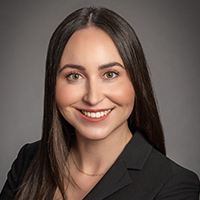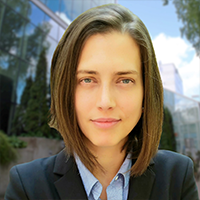
NLD Member Spotlight: Gaia T. Linehan

Law Offices of Eric Becker
Gaia T. Linehan, Esq., is a civil litigation attorney at the San Diego office of Freeman Mathis & Gary. LLP. Her practice focuses on commercial litigation, employment law, and tort matters. She has handled many aspects of civil litigation from pre-litigation alternative dispute resolution through trial.
Prior to the Legal Practice
Throughout her adolescence, Linehan was told she was inquisitive, a logical thinker, and a passionate advocate. At the age of 18, Linehan was drafted to the Israeli Defense Force first as a class commander and later moved to investigate friendly fire accidents.
Linehan studied at Haifa University in her [other] home country, Israel, where she earned her B.A. in English Linguistics and East Asia Studies – including Hindi and Mandarin. During college, she volunteered as a guidance counselor to female youth in distress. Linehan remarks the most satisfying moment as a guidance counselor was when she managed to convince the young females of the alternatives available to them.
Wanting to practice her English and Mandarin, Linehan visited the U.S. after her B.A. studies and was set to move to China for work. However, during her visit to the U.S., she decided to change her work assignment with the Israeli government and asked to relocate to California instead of to Beijing.
Linehan notes “Growing up in Israel, a country full of daily conflicts and intensity, among its own diverse sectors of the population, you learn from an early age to defend for what’s right and protest when something is wrong, no matter any potential backlashes. You develop ‘hutzpah.’”

When Linehan was assured, she would be able to stay in the U.S. permanently by the conclusion of her citizenship process – she felt it was time for her to resign her position with the Israeli government and pursue a career in the American justice system.
Linehan went on to earn her Juris Doctor degree from Chapman University Dale E. Fowler School of Law in Orange, where she graduated magna cum laude, within the top 2% of her class. During her time in law school, she volunteered at Girls, Inc., served as an Editor at Chapman Law Review, and externed for the Honorable Judge James Selna at the United States District Court for the Central District of California and for the Honorable Charles Margines at the Superior Court of California, County of Orange.
The Legal Practice
What Linehan enjoys most about civil litigation is the mental gymnastics. Working for a law firm with a large insurance defense practice, she gets to work on an array of cases from many practice areas where there are no cookie-cutter solutions. Each case mandates its own strategy. She absolutely enjoys every moment of thinking, learning, and implementing a winning strategy for the benefit of her clients and carriers.
Linehan reflects what she enjoys most about working with her clients is when the case comes to an end, and her clients are appreciative of her analysis and ‘tools’ that enabled her to defend them, mitigate exposure, or account for their future. It is both a satisfying and enjoyable experience.
Advice for New Attorneys
Linehan urges new attorneys to stay humble: “While you accomplished so much for yourself so far, by getting through law school and passing the most difficult bar exam in the nation, among various other achievements in your life, you are only at the beginning of your path, with much to learn of the practice of law and endless people to learn from.”
On being an effective litigator, Linehan advises “Do not play games. Rare are the times you know of a ‘smoking gun’ that would defeat opposing party with the Court allowing the surprise element of it. Be upfront, show your cards, and have the other side show theirs – then, talk about it, and reach an early and fair resolution. It can be that simple.”
On getting a job out of law school, Linehan advocates for good grades while in school (best, if possible), networking, and keeping an open channel of communication with the career center at the law school. Linehan notes “I did not know anyone in the field – certainly not in the U.S. – and so for me the key was to work very hard in law school, finish top of my class, and look for a position in which and with people whom I would be happy to spend, sometimes, 2400 hours a year.”